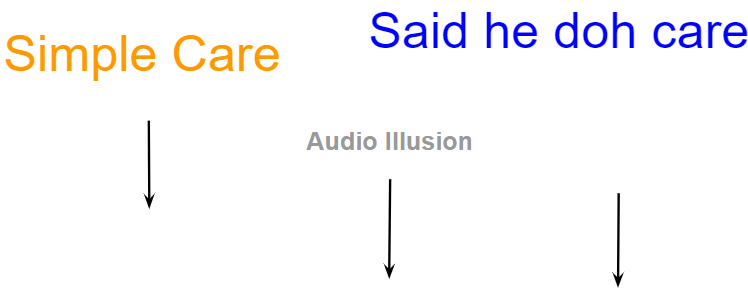Check Out The Audio Illusion
Said he doh care – simple care




What Is Being Said?
The audio clip above is an example of the McGurk effect on written speech.
Depending on which written phrase you look at while listening to the audio illusion, you would hear the respective phrase uttered.
This McGurk effect is experienced from the phrase illusion spoken in Trinidadian English Said he doh care – Simple care.

Sound Wonders & Speech Illusions
A beginners guide to the Science of Sound, Psychoacoustics, Linguistics & Phantom Speech Illusions.
Order on Amazon
What Is the McGurk Effect?
The McGurk effect is a psychological phenomenon of perception where speech can be interpreted differently depending on the visual cues given.
A common example of this is watching the lip movements of someone saying the phrase “ga-ga” while listening to the phrase “ba-ba” spoken instead.
According to Wikipedia, the result we perceive would be something entirely new.
We would hear the phrase “da-da”.
Seeing Is Believing
When it comes to phantom speech illusions, what we perceive from the McGurk effect is the direct result of the words we read at any given time.
While phantom speech illusions are the result of speech sounds heard in some kind of ambiguous way, visually perceiving what is being said causes the McGurk effect to have a more direct effect on our perceptions.
In other words, we hear the words that we read.
Inside of The Mind
The McGurk effect is possible due to the neural mechanisms of the brain that inform perception.
According to NIH, the superior temporal sulcus (STS) may be the part of the brain responsible for the psychological ability for us to perceive speech sounds in different ways when presented with additional visual information.
An fMRI shows areas of the brain that are the most active when presented with conflicting visual and auditory stimuli.
A lot of what we perceive from the McGurk effect is based on prior expectations of the visual prompts we associate with those speech sounds.
Therefore, the optical activity that causes the McGurk effect creates an audio illusion.

Sound Wonders & Speech Illusions
A beginners guide to the Science of Sound, Psychoacoustics, Linguistics & Phantom Speech Illusions.
Order on Amazon
Some Examples Known
Another compelling example of this phenomenon involves hearing the word “fa” after observing the lip movements required to produce the fricative consonant “fa” when the actual speech sound spoken is “ba”.
In other experiments cited by youtuber Illuminating Realities, when a phoneme such as /d/ is heard, but the lip movements of a person pronouncing /n/ is seen instead, the resulting McGurk effect is the phoneme /t/ that would be heard.
Check out Sound Wonders & Speech Illusions to learn more about the world of audio phenomena.
